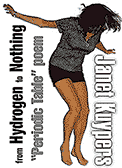from Hydrogen to Nothing
Janet Kuypers

from the “ Periodic Table of Poetry” series (#085, At)
(with references to the poem “Fantastic Car Crash”, 7/3/98)
Love is like tap water,
free flowing…
Remember when you were little,
just put a glass under the faucet
and quench your thirst?
Wait a minute,
it’s not like that.
Water isn’t free.
You even have to pay
for the water in your own home,
and
it’s not even clean.
What you’re getting is dirty.
And you still have to pay for it.
#
You know, they say us humans
are like seventy percent water.
And when I think of you,
and all the time we were together —
well, if you’re seventy percent water,
I have to remember
that it wasn’t pure and clean with you.
If this was love;
if this was you —
it wasn’t free.
I’m still paying for it.
#
I mean, they say we’re mostly made of water,
Hydrogen, oxygen…
But it’s like you were
an electron from Hydrogen to me,
one electron,
spinning around
the center of me,
always keeping
an all too tight
grip on me.
I would think I was free,
and there you would be,
that one presence
I could never get rid of.
You were spinning, orbiting,
spinning my head…
You were keeping your distance,
but still,
you made sure
you were always there,
holding me down.
If we’re mostly made of water,
and you spun around me
like in that Hydrogen atom,
you kept me gasping for air.
I needed that oxygen…
I know water is Hydrogen and oxygen,
I know I’ve got it in me,
I’ve just got to keep myself together
after dealing with what you’ve done to me.
#
When we’re seventy percent water,
by mass we’re only eleven percent
Hydrogen.
So most of the mass in our body
may be oxygen…
But by an atomic percentage
we’re sixty-seven percent
Hydrogen,
meaning most of the atoms
in our bodies
are Hydrogen.
Just one electron,
spinning around that nucleus,
just spinning,
and never letting go.
#
When I now think of you,
and the fact that you made me feel like nothing —
well, I think of what you’re made of,
and I have to remember:
we’re all made of atoms,
protons and neutrons,
infinitely small,
wound tightly together in the nucleus
surrounded
at a comparatively vast distance
by occasional,
tiny,
orbiting
electrons.
So when I think of you
I have to remember
that you’re made of those atoms
with really tiny cores —
and those atoms are filled with so much space
that you’re mostly made of nothing.
When I think of you,
I remind myself of this.
When I think of the nothingness you made me feel,
and the fact that you should mean nothing to me,
this is how I must think of you.

